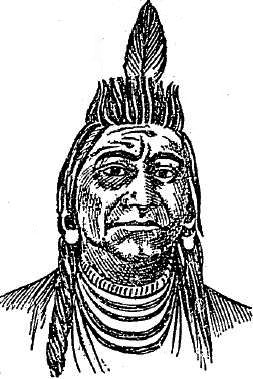Indian Bookkeeping
Pictoral Statements Accepted in Implicit Faith
And the merchant never lies
Possibly because he has not yet succumbed to the "Evangelizing" of the missionary
A unique ledger
(Special Letter)

(CHIEF) PLENTY-COUPS
From a portrait painted by Mr. E. A. Burbank
Keeping a ledger is altogether beyond an ordinary Indian's power. An Indian buys one dollar's worth or two dollar's worth, or five dollar's worth; he does not bother with the odd cents. If he wants 25 cents' worth of chewing tobacco he buys four packs for a dollar rather than puzzle out the change, which simplifies matters both for customer and storekeepers.
On the Crow reservation near Pryor, Montana, there is one. Some 70 miles from the agency a store is kept by Plenty-Coups, principal chief of the Crows. Now Plenty-Coups can print and cipher about as well as a 7-year-old boy. The three Rs are unfamiliar ground to him, as to the majority of his customers. Some of them pay cash; they take their purchase, Plenty-Coups drops the money into his box, and both parties are satisfied, without any written record of the transaction. For the accomodation of people who do not pay cash he keeps account in the most primitive way. On a sheet of common brown wrapping paper he draws a picture of the customer's name. There is no misreading the rude sketch which stands for Walking-Bear or Crazy-Crane, while the amount of the gentleman's debt is plainly marked over his effigy and hitched to it by a wriggly pencil line. Suppose Mr. Elk or Mrs. Plenty-Shells - for, as in most civilized communities, women do a large part of the shopping - having spent $5 at the store spends three more, or pays two on account. Plenty-Coups rubs the original figure out and writes a new one. At the end of the year all accounts are squared and all ledgers - brown papers - burned. There is nothing in the world to prevent the storekeeper from tampering with his balance sheet. He can erase figures at will and alter them to his own advantage. The whole Crow nation, however much they might suspect him, could prove nothing. The simple fact is that he does not betray his trust. And they know he does not.
His store is not a government agency, but a private enterprise. Plenty-Coups bought his own stock and fixtures, such as they are. He, his squaw, and one other Indian deal out the supplies and pocket the profits or losses with true Indian stolidity. His squaw, by the way, is his second wife, and might be called the third. He had two when he came to the reservation, was honestly attached to both, and, when obliged to give up one, went through a long period of painful indecision. After a month of hesitation he finally conformed with the white man's custom - kept the one who was consumptive and reluctantly let the other one go. For five years he supported the discarded wife and she took no other husband. By and by Mrs. Plenty-Coups fell ill. Then did the cast-off squaw return to tend her sick rival and faithfully wait upon her former lord. The sick woman died. One would now expect the long separated pair to come together again. Strange to say, Plenty-Coups took unto himself a new wife and the old one still lives by herself. Here is a whole end-of-the-century Indian romance.